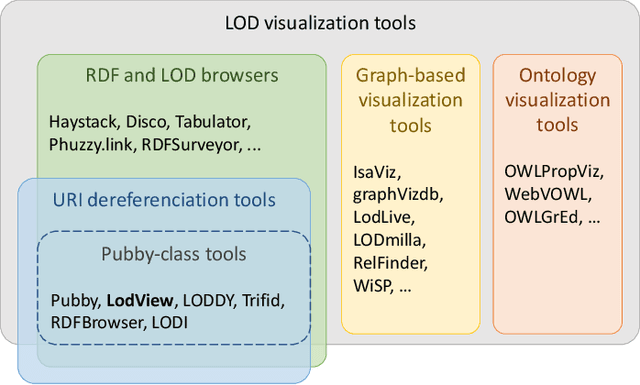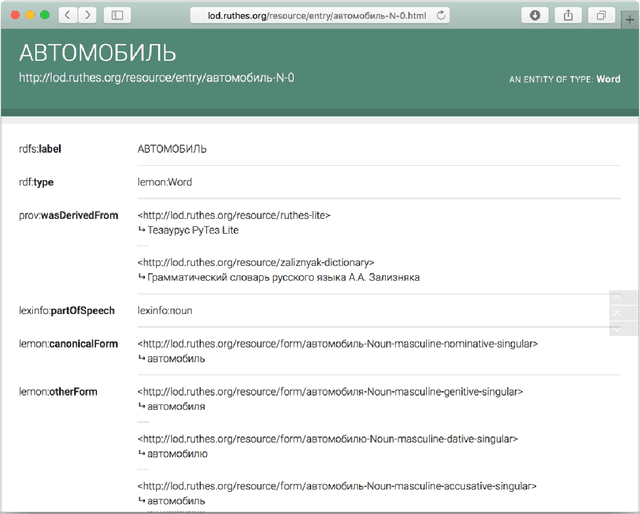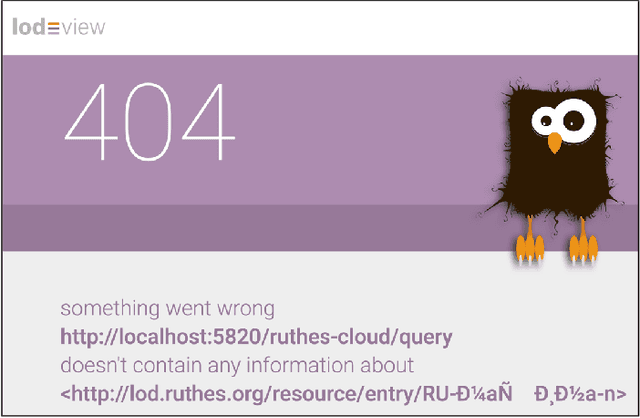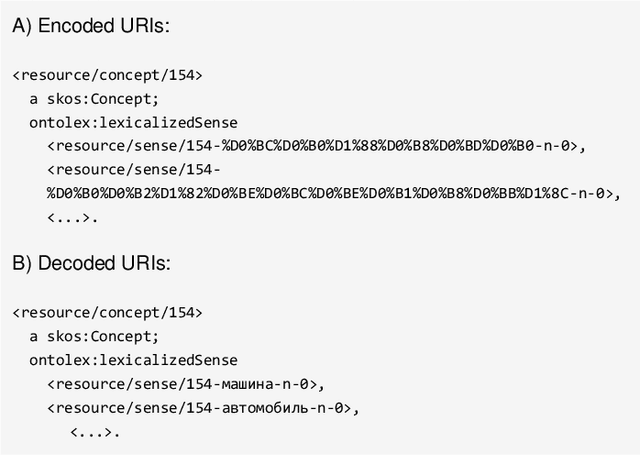Alexander Kirillovich
OntoMath${}^{\mathbf{PRO}}$ 2.0 Ontology: Updates of the Formal Model
Mar 17, 2023Abstract:This paper is devoted to the problems of ontology-based mathematical knowledge management and representation. The main attention is paid to the development of a formal model for the representation of mathematical statements in the Open Linked Data cloud. The proposed model is intended for applications that extract mathematical facts from natural language mathematical texts and represent these facts as Linked Open Data. The model is used in development of a new version of the OntoMath${}^{\mathrm{PRO}}$ ontology of professional mathematics is described. OntoMath${}^{\mathrm{PRO}}$ underlies a semantic publishing platform, that takes as an input a collection of mathematical papers in LaTeX format and builds their ontology-based Linked Open Data representation. The semantic publishing platform, in turn, is a central component of OntoMath digital ecosystem, an ecosystem of ontologies, text analytics tools, and applications for mathematical knowledge management, including semantic search for mathematical formulas and a recommender system for mathematical papers. According to the new model, the ontology is organized into three layers: a foundational ontology layer, a domain ontology layer and a linguistic layer. The domain ontology layer contains language-independent math concepts. The linguistic layer provides linguistic grounding for these concepts, and the foundation ontology layer provides them with meta-ontological annotations. The concepts are organized in two main hierarchies: the hierarchy of objects and the hierarchy of reified relationships.
Adapting the LodView RDF Browser for Navigation over the Multilingual Linguistic Linked Open Data Cloud
Aug 30, 2022



Abstract:The paper is dedicated to the use of LodView for navigation over the multilingual Linguistic Linked Open Data cloud. First, we define the class of Pubby-like tools, that LodView belongs to, and clarify the relation of this class to the classes of URI dereferenciation tools, RDF browsers and LOD visualization tools. Second, we reveal several limitations of LodView that impede its use for the designated purpose, and propose improvements to be made for fixing these limitations. These improvements are: 1) resolution of Cyrillic URIs; 2) decoding Cyrillic URIs in Turtle representations of resources; 3) support of Cyrillic literals; 4) user-friendly URLs for RDF representations of resources; 5) support of hash URIs; 6) expanding nested resources; 7) support of RDF collections; 8) pagination of resource property values; and 9) support of $\LaTeX$ math notation. Third, we partially implement several of the proposed improvements.
OntoMath Digital Ecosystem: Ontologies, Mathematical Knowledge Analytics and Management
Feb 16, 2017



Abstract:In this article we consider the basic ideas, approaches and results of developing of mathematical knowledge management technologies based on ontologies. These solutions form the basis of a specialized digital ecosystem OntoMath which consists of the ontology of the logical structure of mathematical documents Mocassin and ontology of mathematical knowledge OntoMathPRO, tools of text analysis, recommender system and other applications to manage mathematical knowledge. The studies are in according to the ideas of creating a distributed system of interconnected repositories of digitized versions of mathematical documents and project to create a World Digital Mathematical Library.
Mathematical Knowledge Representation: Semantic Models and Formalisms
Aug 29, 2014Abstract:The paper provides a survey of semantic methods for solution of fundamental tasks in mathematical knowledge management. Ontological models and formalisms are discussed. We propose an ontology of mathematical knowledge, covering a wide range of fields of mathematics. We demonstrate applications of this representation in mathematical formula search, and learning.
$OntoMath^{PRO}$ Ontology: A Linked Data Hub for Mathematics
Aug 11, 2014



Abstract:In this paper, we present an ontology of mathematical knowledge concepts that covers a wide range of the fields of mathematics and introduces a balanced representation between comprehensive and sensible models. We demonstrate the applications of this representation in information extraction, semantic search, and education. We argue that the ontology can be a core of future integration of math-aware data sets in the Web of Data and, therefore, provide mappings onto relevant datasets, such as DBpedia and ScienceWISE.
 Add to Chrome
Add to Chrome Add to Firefox
Add to Firefox Add to Edge
Add to Edge